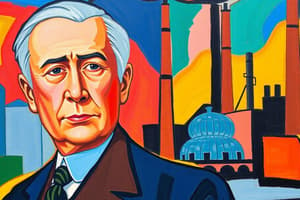Podcast
Questions and Answers
What was Laurier's approach to Canada's involvement in the Boer War?
What was Laurier's approach to Canada's involvement in the Boer War?
- He advocated for a peace treaty with the Boers.
- He imposed conscription for all able-bodied men.
- He supported only volunteer enlistment. (correct)
- He refused to send any troops.
Laurier supported the creation of a permanent imperial council to strengthen ties with the British Empire.
Laurier supported the creation of a permanent imperial council to strengthen ties with the British Empire.
False (B)
What significant action did Canada take regarding its navy in 1910?
What significant action did Canada take regarding its navy in 1910?
Canada created its own Navy.
Laurier's compromise regarding military support during the Boer War involved sending volunteers and not imposing __________.
Laurier's compromise regarding military support during the Boer War involved sending volunteers and not imposing __________.
Match the following issues with their impact under Laurier's government:
Match the following issues with their impact under Laurier's government:
Which factor worried Laurier about Canada's military contributions to Britain?
Which factor worried Laurier about Canada's military contributions to Britain?
What strategy did Laurier implement to encourage immigration to Canada?
What strategy did Laurier implement to encourage immigration to Canada?
One third of immigrants to Canada were from the USA.
One third of immigrants to Canada were from the USA.
What was one of the main agricultural impacts of the immigration policy in Canada?
What was one of the main agricultural impacts of the immigration policy in Canada?
The fear or dislike of people from other countries is known as __________.
The fear or dislike of people from other countries is known as __________.
Match the following groups with their associated regions in Canada:
Match the following groups with their associated regions in Canada:
What was a consequence of increased immigration in Western Canada?
What was a consequence of increased immigration in Western Canada?
The Manitoba School Question was about increasing French representation in schools.
The Manitoba School Question was about increasing French representation in schools.
What natural resources attracted new colonists to Abitibi despite its rocky terrain?
What natural resources attracted new colonists to Abitibi despite its rocky terrain?
In 1908, the number of Japanese immigrants allowed to enter Canada was restricted to __________ per year.
In 1908, the number of Japanese immigrants allowed to enter Canada was restricted to __________ per year.
What was Wilfrid Laurier's political party during his time as Prime Minister?
What was Wilfrid Laurier's political party during his time as Prime Minister?
Wilfrid Laurier was the first Anglophone Prime Minister of Canada.
Wilfrid Laurier was the first Anglophone Prime Minister of Canada.
What was Laurier's approach to British Imperialism?
What was Laurier's approach to British Imperialism?
Henri Bourassa was a French Canadian journalist and _____ who advocated for nationalism.
Henri Bourassa was a French Canadian journalist and _____ who advocated for nationalism.
Match the following concepts with their description:
Match the following concepts with their description:
Which group primarily supported British Imperialism in Canada?
Which group primarily supported British Imperialism in Canada?
French Canadians felt a strong sense of belonging to the British Empire.
French Canadians felt a strong sense of belonging to the British Empire.
What was one impact of Laurier’s policies on agricultural development?
What was one impact of Laurier’s policies on agricultural development?
The idea of an 'empire on which the sun never sets' reflects the _____ of the British Empire.
The idea of an 'empire on which the sun never sets' reflects the _____ of the British Empire.
Which issue was a significant concern for Franco-Ontarians during Laurier's time?
Which issue was a significant concern for Franco-Ontarians during Laurier's time?
Flashcards
Laurier's Boer War Policy
Laurier's Boer War Policy
Laurier supported Canadian involvement in the Boer War but opposed conscription. Only volunteers were sent to fight.
Laurier's Compromise
Laurier's Compromise
Laurier aimed for a balance between supporting Britain and preserving Canadian autonomy, avoiding mandatory participation in military conflicts by using compromise.
Boer War
Boer War
A conflict between the British and the Boers (Dutch settlers) in South Africa, triggered by British desires for gold-rich territories.
Canadian Navy (1910)
Canadian Navy (1910)
Signup and view all the flashcards
Imperial Council
Imperial Council
Signup and view all the flashcards
Laurier's Dilemma
Laurier's Dilemma
Signup and view all the flashcards
Macdonald's Immigration Policy
Macdonald's Immigration Policy
Signup and view all the flashcards
Immigration Origins (1879)
Immigration Origins (1879)
Signup and view all the flashcards
Impact of Immigration on Western Agriculture
Impact of Immigration on Western Agriculture
Signup and view all the flashcards
Abitibi Colonization
Abitibi Colonization
Signup and view all the flashcards
Rise of Xenophobia
Rise of Xenophobia
Signup and view all the flashcards
1900 Head Tax on Chinese Immigrants
1900 Head Tax on Chinese Immigrants
Signup and view all the flashcards
Limited Japanese Immigration
Limited Japanese Immigration
Signup and view all the flashcards
Francophone Demographic Shift
Francophone Demographic Shift
Signup and view all the flashcards
Manitoba School Question (1890)
Manitoba School Question (1890)
Signup and view all the flashcards
Wilfrid Laurier's political party
Wilfrid Laurier's political party
Signup and view all the flashcards
Laurier's time as Prime Minister
Laurier's time as Prime Minister
Signup and view all the flashcards
British Imperialism definition
British Imperialism definition
Signup and view all the flashcards
Imperialists (Canada)
Imperialists (Canada)
Signup and view all the flashcards
French Canadian Nationalists
French Canadian Nationalists
Signup and view all the flashcards
Henri Bourassa
Henri Bourassa
Signup and view all the flashcards
Colonial Conference in London (1897)
Colonial Conference in London (1897)
Signup and view all the flashcards
Canada in British Empire
Canada in British Empire
Signup and view all the flashcards
Joseph Chamberlain
Joseph Chamberlain
Signup and view all the flashcards
Study Notes
Chapter 2: Laurier's Liberals
- Nationalism and Autonomy of Canada: A chapter focused on Canada's relationships with Britain and internal nationalistic feelings.
- Sir Wilfrid Laurier: Canada's Prime Minister (1896-1911) from the Liberal party. First French-Canadian Prime Minister.
- Attempted Unification: Laurier tried bringing together French and English Canadians.
- British Imperialism: The imposing of British culture, values, and political structures on other regions (in this case, Canada).
- English Canadians: Proud of their ties with Britain, wanting Canada to grow the British Empire.
- French Canadians: Felt they didn't fully belong to the British Empire. Wanted more autonomy and more distance from the British Empire.
- Nationalism (French Canadian): Strong attachment to French Canadian identity. Defending French language and rights.
- Henri Bourassa: An anti-imperialist journalist/politician. Advocated for French-Canadian nationalism.
- Laurier's Policy of Compromise: Tried to find a balance between imperialists and French Canadian nationalists. Wanted close ties with Britain while promoting Canada's independence.
- Colonial Conference in London (1897): Laurier attended a conference to strengthen ties with the British Empire but rejected the proposal for a permanent imperial council.
- Boer War (Challenge #1): Britain wanted land in South Africa (Dutch settlers were there); Britain attacked the Boers. Canada was asked to help with the war. Laurier supported but opposed conscription.
- Navy (Challenge #2): Britain asked Canada for money. Laurier created its own Canadian navy in 1910 to give Canada more control. He worried that involving themselves in every British war would be draining.
- Immigration Policy (1879 onwards): Continued Macdonald's policy but with greater resources. Attracted immigrants with brochures, posters, land offers, and paid passage on ships.
- Origins of Immigrants: Mostly from United Kingdom, the USA, and mainland Europe. Limited restrictions on Europeans and Americans.
- Effects of Immigration Policy: Led to more agricultural land with the distribution of land in townships. Alberta and Saskatchewan formed in 1905, growing as provinces.
- Abitibi Colonization (1910): French still left Quebec for the USA. Quebec relaunched the program to settle Abitibi. Railroad access. Natural resources drew folks in.
- Impact of Immigration in Western Canada: Rise of xenophobia (dislike of foreigners). Western provinces had difficulties with immigrants from Europe, which led to conflict with established communities.
- Chinese and Japanese Immigrants: Settled in neighborhoods to maintain their culture; there was fear that the immigrants would outnumber British citizens and take over culture. Later, restrictive measures were enacted.
- Francophone Catholic Minorities: The massive influx of immigrants to Western Canada decreased the population weight and political power of Francophones; limited their ability to defend their rights.
- Manitoba School Question and the Laurier-Greenway Compromise (1890s): A struggle over the use of French in Manitoba schools. Laurier attempted a compromise to address this.
- Regulation 17 (1912): In Ontario, French-language instruction limited to the first two years in elementary school.
Studying That Suits You
Use AI to generate personalized quizzes and flashcards to suit your learning preferences.




